Part Three of the Five-Part MMIP Symposium Series On May 5th, 2022 in Fargo, ND- the University of North Dakota’s Student Social Work Association (Phi Alpha) held a Missing &...
This content is for MHATimes Premium, MHATimes Annual, and MHATimes 1 Month members only.
Login Join Now
